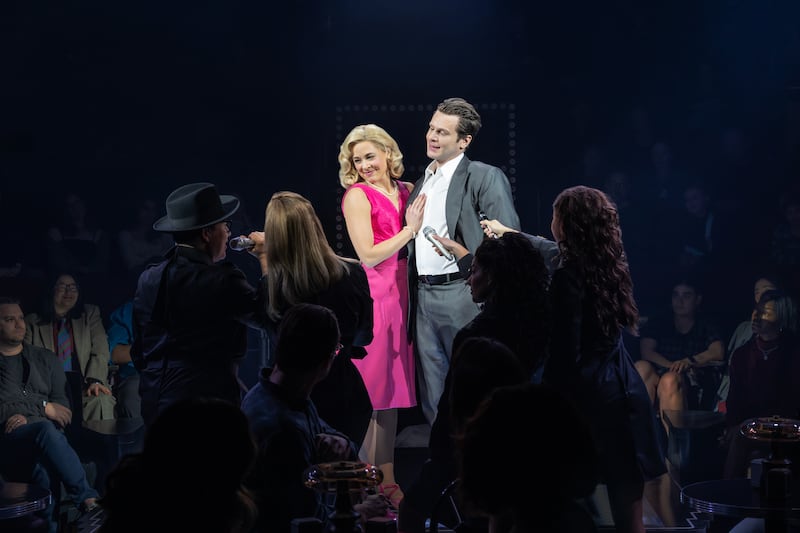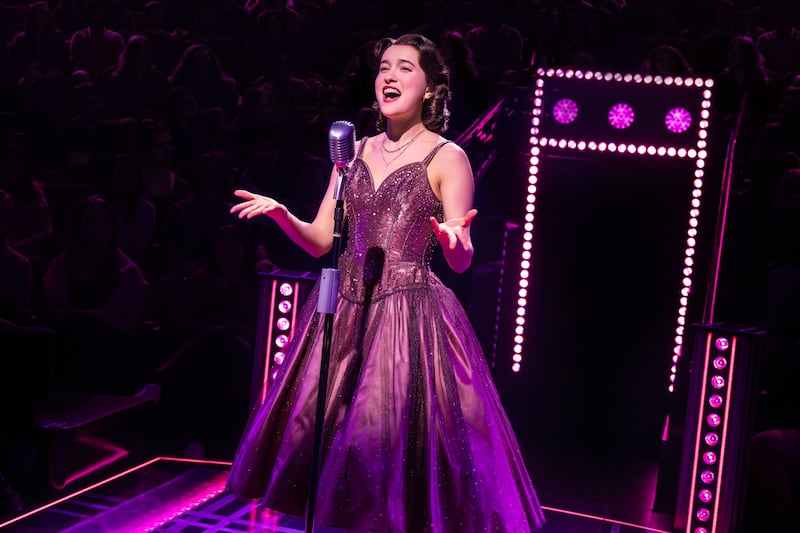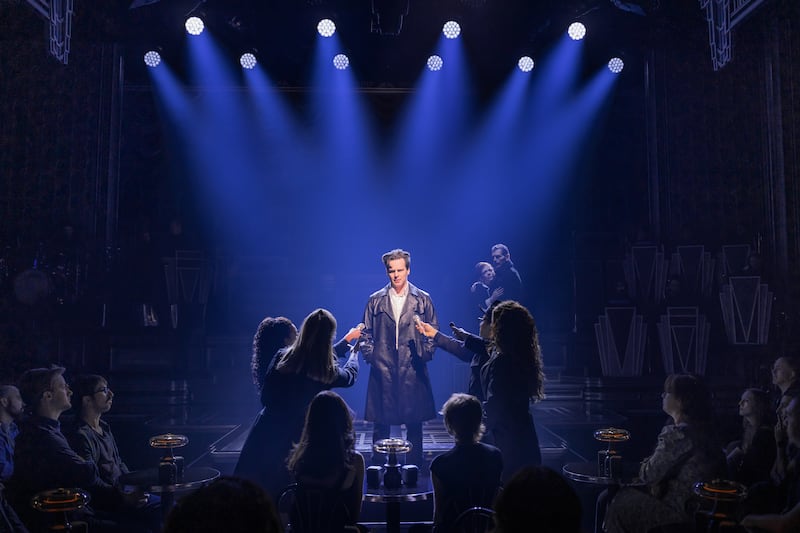The makers of any show based on the life of a famous person—especially when the subject is long-dead—have a substantial checklist to work through before a word is written. Is the figure well-enough known to merit an audience wanting to come see a production about them, many years later? If they’re not, is the actor playing them well-enough known to lock in a modern-day audience?
What does the audience already know about the subject? Is that subject compelling enough to have a story told about them—and, if they are, how much are you going to tell and how deep will you go in telling it?
All of these questions swirled through my mind watching Jonathan Groff gamefully sing his way through the life of Bobby Darin in the jukebox bio-musical Just in Time (Circle in the Square, booking to July 27). The beguiling Groff is fresh from deservedly winning the Tony for playing Franklin Shephard in the Broadway revival of Merrily We Roll Along, in which he co-starred—or rather co-shone—alongside Daniel Radcliffe and Lindsay Mendez.
Darin is a known name, but—among a general populus at least, rather than devoted fans—not that well-known as a figure, and not much discussed or remembered. He died, aged 37, in 1973, over 50 years ago, and is most famous for the songs “Splish Splash,” “Dream Lover,” “Mack the Knife,” and “Beyond the Sea.”

Just in Time showcases all of those songs brilliantly, and is full of pizazzy performance. It’s a lovely concert, but not a revelatory show about the life of Bobby Darin.
Darin lived all his life knowing he may die young—as he eventually did—because of a weakened heart. The woman he thought was his mother (an exceptional performance by Michele Pawk as Polly) was his grandmother; the woman he thought was his sister (Emily Bergl as Nina) was his mother—a revelation that led to a period of self-imposed withdrawal from the world. After returning to singing and showbiz, a bout of sepsis led to open heart surgery and then a far-too-premature death.
Darin’s two major relationships were with the singer Connie Francis (played by Gracie Lawrence in the show), who he wanted to marry—although her furious father put an end to that, once threatening to shoot Darin. Instead, Darin married movie star Sandra Dee (Erika Henningsen) in 1960; they had a son, Dodd, a year later, and divorced in 1967. Darin married again in 1970, to a legal secretary named Andrea Yaeger; they divorced three years later just before his death (she does not feature in the show).
Given that many will be buying tickets to see Groff, it makes absolute sense to introduce both Darin and Groff as a pair in Groff’s witty introduction (the book is by Warren Leight and Isaac Oliver), which both lays out who Darin was alongside the adventures of the young wannabe musical star Groff, happily dragged up in his mom’s clothes at home.
Groff wisecracks, “Whether you’re a fan of Bobby Darin, or one of the twelve people who watched Mindhunter—it doesn’t matter how I got you, all that matters is that you’re here and, tonight, you’re mine.”

He also warns his fellow performers how drenched he becomes while performing (thankfully, he’s a snazzy quick-changer). “Boy, are they gonna get spat on. And sweated on. I’m a wet man, I’m just generally extremely very wet when I do this, and I’m sorry in advance.”
It’s too bad the musical doesn’t keep the twin tracks of both men’s lives going as a through-line. That would have made for a more compelling push-pull following Darin and Groff through their contrasting lives and careers—both immersed in music in two very different eras, one straight and one gay. But this becomes solely Darin’s story, with Groff winking to us about the conceit unfolding in front of us.
Alex Timbers, who directed and developed the show, and scenic designer Derek McLane have decked out Circle in the Square to deliberately replicate Darin’s preferred environment: the nightclub. Justin Townsend’s bright, glitzy lighting, Shannon Lewis’ smart and showy choreography and Catherine Zuber’s fabulous costumes add to the era-drenched escapism.
Together with Peter Hylenski’s sound design, smoothly animating all the singing and orchestral dash, Timbers effectively collapses our viewing space into the locations of Darin’s showbiz past. Sit at one of the tables on the floor of Circle in the Square, and get ready for family and relationship dramas to be enacted and sung right in front of you, and to be serenaded. The characters make full use the venue’s stairwells for quick escapes and arguments.
All the numbers are well executed. Valeria Yamin, Christine Cornish, and Julia Grondin are shimmering backing singers; Lawrence sings Francis’ numbers with power and command, and she and Henningsen are blow-the-rafters excellent with a “Mack the Knife” duet-reprise in the finale. Caesar Samayoa, Lance Roberts, and Joe Barbara play multiple characters with brio and charm. Darin’s best-known songs are a delight, with Groff ending up completely disrobed in a bath with a rubber duck for “Splish Splash.”
However, the show loses momentum, indeed becomes a lethargic drag, with its unfocused, dull examination of the marriage of Darin and Dee. Here, the show scratches the surface of a darker side to Darin—a cruel and thoughtless side—but it doesn’t dwell there. Instead, Just in Time muddies more questions than it answers around Darin’s unwillingness to compromise versus Dee’s apparent ease in giving up her own career in service to marriage and parenthood. Both things may be true (or not), but the musical leaves their marital mysteries, and what kind of partner Darin really was, blowing in the breeze.
Similarly, the relationship as presented between Francis and Darin is a puzzle; the conflict with her dad, the relationship’s sudden collapse: what really happened there, you wonder.
Better written and performed is the relationship between Darin and his not-mother Polly, who wanted Darin to succeed at all costs. Her appearance as a plain-speaking ghost towards the end—Darin at this point living in the woods, depressed and shaken up having found out she wasn’t his biological mother—serves up one of the gasp-out-loud funniest lines on Broadway this season. Of heaven, Polly says: “It’s dead up there—I should’ve gone to hell.”

Leight and Oliver also cleverly use Polly’s spirit to raise the show out of the necessarily sad cul-de-sac it finds itself in as it illustrates Darin’s depression. As a ghost, Pawk tells Groff-as-Darin what a musical audience wants to hear with the end of a razzle-dazzle show in sight: Get back on stage, and get singing pronto! The moment encapsulates the see-sawing tension of a show that is smoothest when singing rather than telling.
Groff makes clear the intention of Just in Time, indeed any show, at its end. “Doing this was when he (Darin) felt the most alive,” he says. “Honestly? Same. This can only happen in this room, right now, with you, and it’ll never happen quite the same way again.”
That may read as hokey on the page, but Groff, Leight, and Oliver intend it as a final, heartfelt statement about the power of theater to connect. If nothing else, Just in Time hopes we recognize the efforts of all performers—lost to history, or not—in service of that.
The post Jonathan Groff Is a Wildly Entertaining Bobby Darin in New Musical appeared first on The Daily Beast.




